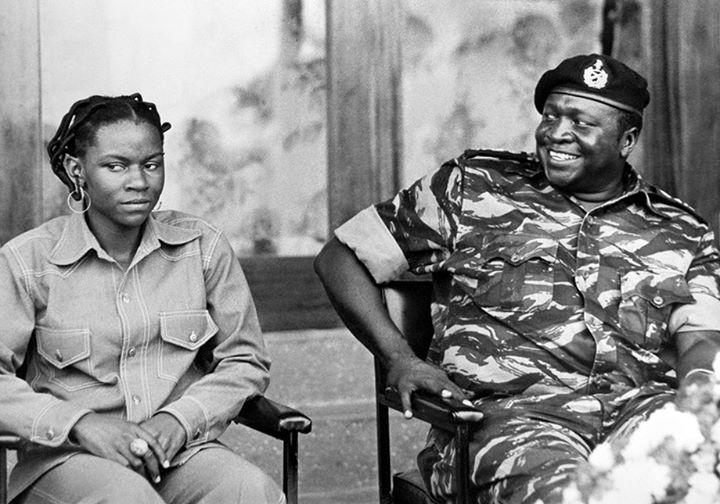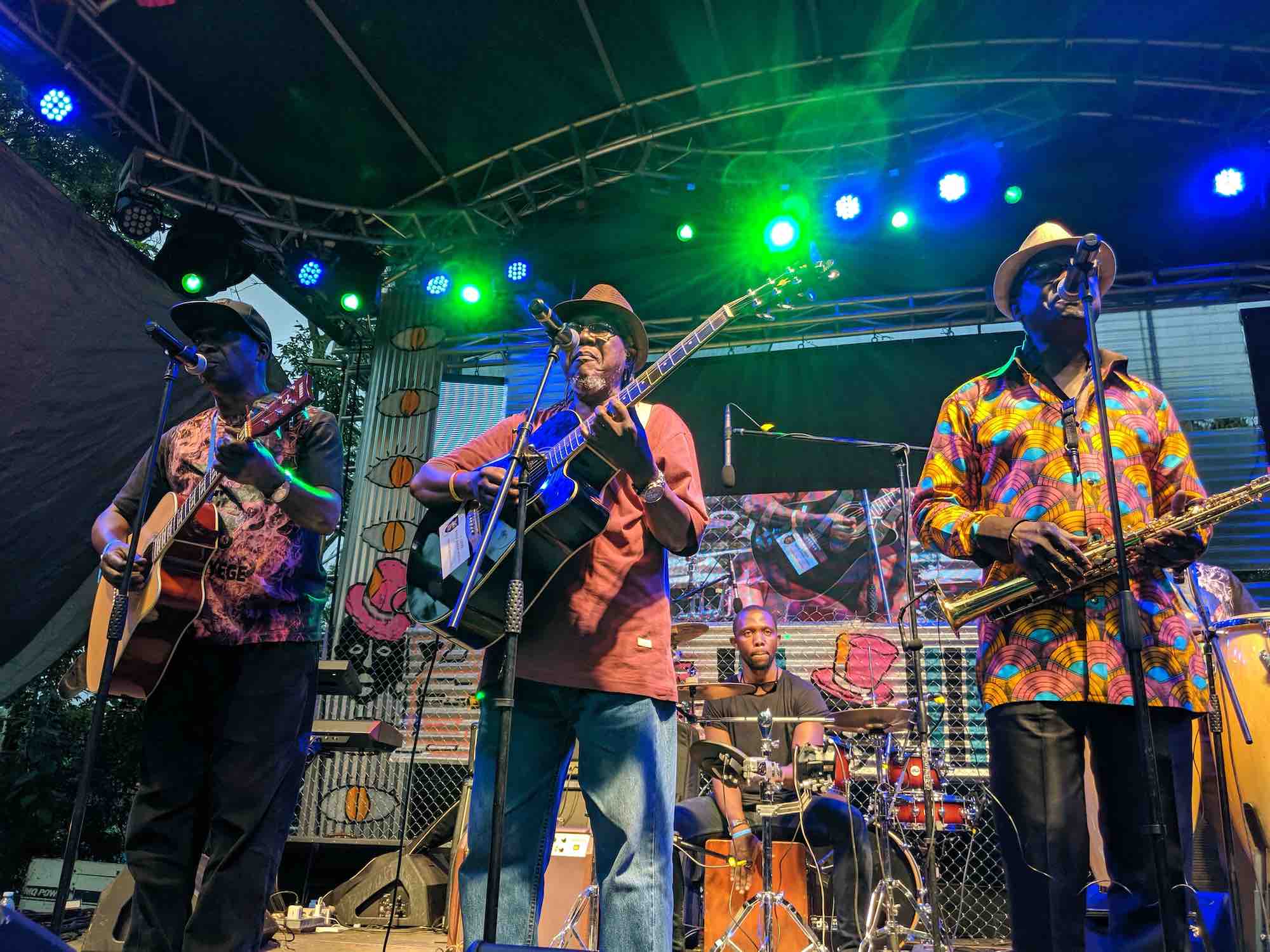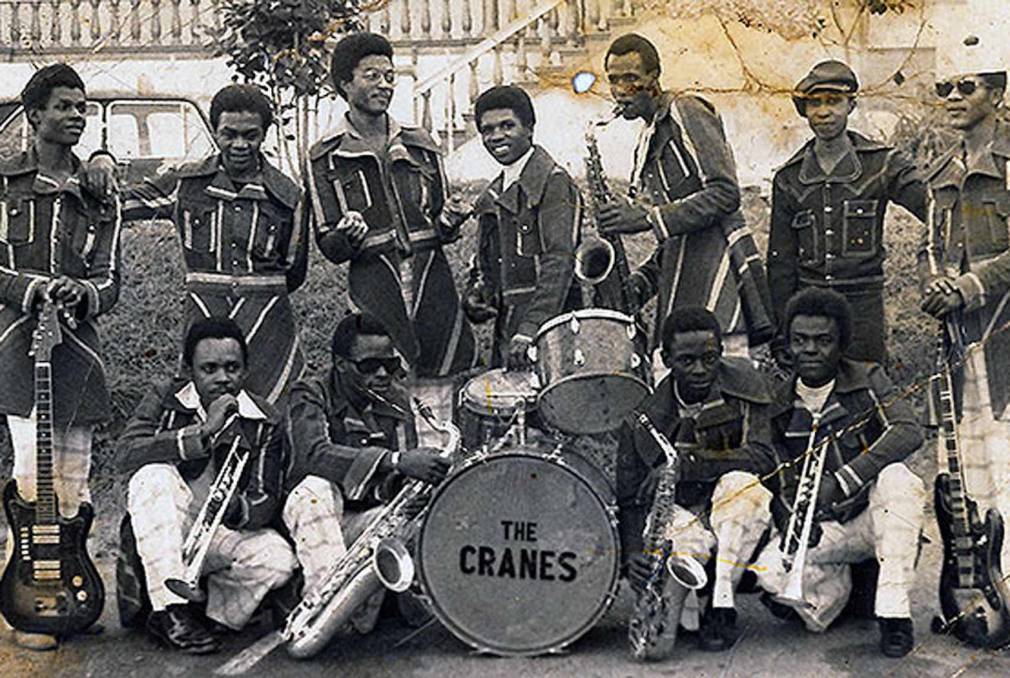Considered by many as the godfathers of modern music in Uganda, The Cranes reunited after a 44-year hiatus for a history-making concert at the Nyege Nyege Festival. PAM revisits the band’s musical fortunes, closely tied with the nation’s political history – for better or for worse.
Day 3. The beats are heavy and festival-goers are reduced to sonic bodies – electronically charged ones for the most part. And then comes time for the Cranes to take the main stage at Nyege Nyege. Elegantly dressed, clutching their sax and guitar, Moses Matovu and Tony Senkebejje look as if they have just crash-landed in from another dimension: the two 70-something-year-olds are somewhat out of sync with the futuristic settings of Uganda’s biggest festival, in a country where nearly 50% of the population is under 15 years old. “The Cranes are everyone’s grandfathers,” comments a young woman standing in the front row. You can feel the emotion in the audience and on stage, and for good reason: celebrated as Ugandan national superstars from 1965 to 1975, they reunite today on stage for the first time in 44 years. And as the storm breaks through the skies, the wholly unique sound of the veterans present the audience with a cool breeze of nostalgia.
Everyone’s grandfathers
Formed by three teenagers in Kampala in 1965, they became immensely popular amongst high school students for imitating the sounds of the Beatles and the Rolling Stones, despite disapproval from the elders who considered rock’n’roll and its devilish dances to go against positive evolution. Little by little, The Cranes began to draw from local traditional music and also incorporated brassy funk and soul touches to their repertoire – they would eventually establish their signature sound when the Congolese rumba fever of TP OK Jazz swept through Uganda. Five years on, they won over the mainstream and the then 11-member band, recorded dozens of singles while clubs, hotels and radio stations snapped them up.
Despite their success story, The Cranes have, surprisingly, recorded only one album; Ten Hits. This rarity, originally released in 1974 is set to be reissued soon. “The musicians who play with us today are indeed young, but they grew up listening to our hits, and that’s the best way to learn them. We were so popular at that time that even the national football team took our name!” Tony Senkebejje boasts whilst laughing. He and Moses Matovu are among the few survivors of this golden age which could have lasted “at least thirty more years”, according to them, if only bass player and arranger Jessy Guitta Kasirivu had not been assassinated in 1974 – remotely carried out under the command of the ruthless Idi Amin Dada, the self-proclaimed “president for life” to the Ugandans until 1979.
A love triangle
“We were so happy when Idi Amin Dada took power from Obote in 1971,” recall the two musicians. At the time, The Cranes even sang the militant political leader’s praises in “Twawona Okufa”: “We survived death / Our man Amin is a hero-soldier / Long live Amin!”. Those lyrics are hard to believe when you consider that the man who liked to present himself as “a man of action” tortured and murdered several hundred thousand people – blown apart by dynamite, fed to crocodiles, shot down in public, or even crushed by tanks! “At the time, in clubs, we were forced to play nonstop until the early morning. But Idi Amin Dada changed the rules: bringing the closing time forward to 1 am. That was truly awesome! And he truly loved music. He supported the bands, bought us instruments…” explains Moses Matovu. Things however changed rapidly from there.
From 1972, Idi Amin Dada banned student balls and mini-skirts, in a series of reforms followed by various ethical adjustments which are reminiscent of the stances of Simon Lokodo, current Minister of State for Ethics & Integrity and a tireless critic of the Nyege Nyege Festival. Back in the 1970s, when Idi Amin Dada set up the State Research Bureau, a kind of death squad designed to suppress all forms of opposition as well as the Ugandan intelligentsia. But everything began to change noticeably when The Cranes were forced to perform for the cruel tyrant, in a private reception he threw in his villa, on the shores of Lake Victoria… It was backstage however, that the real tragedy was being played out.
“Our bassist Jessy was as madly in love with Sarah Kyolaba as he was with being a good musician,” tells Moses Matovu. Sarah Kyoloba was a 19-year old dancer in the Revolutionary Suicide Jazz Band. The two artists were the perfect couple, until Idi Amin Dada decided to set his sights on the young woman whom he would eventually “convince” to share his life with. From then on, the most dangerous love triangle began. “The pressure was unbearable. We were forced to play for Amin when at the same time Jessy was being followed constantly by SRB agents. It was such a perverse situation! We were all very scared. But he stood up to Amin, because he didn’t want to abandon Sarah,” recalls Tony Senkebejje, who fearfully went into exile to Kenya for the next seventeen years. Then, in the summer of 1974, Jessy Guitta Kasirivu composed “Ggwe Nonze”, a song which was pretty much a marriage proposal. Sarah then fell pregnant…
But on the 4th of August, the musician was kidnapped, and indefinitely disappeared – several sources claim that Idi Amin Dada kept the victim’s head in his own freezer. By force or pure fatalism, Sarah Kyolaba would become Idi Amin Dada’s fifth wife in 1975 – Yasser Arafat was the couple’s witness –, she gave birth to several children (including the one she had with Jessy) before leaving him in 1983, to settle down in London where she spent the rest of her life. “The Cranes never recovered from Jessy’s death. We recorded the album anyway, but it wasn’t the same without him. So we decided to break up in 1975. This story still haunts us today, you know,” utters Moses Matovu – who went on to form the Afrigo Band shortly after, the oldest and most famous Ugandan band to date. The wind starts to pick up, it sounds like it’s gonna rain. Tony Senkebejje whispers: “Can you feel it? Jessy is there, he is listening to us.” Shivers run down our spines.

“People Power”
In the spring of 2019, the story of Jessy Guitta Kasirivu premiered in the documentary film titled Bwana Jogoo: The Ballad of Jessy Guitta directed by Michiel Van Oosterhout, a Dutch filmmaker who had a front-row seat to this historical concert at the Nyege Nyege Festival. The Cranes played a collection of their hits, including the infectious “What’s Love” which the band recorded another version of especially for the film. Deeply moved, the director explained to me that he played an essential part in reuniting the band, of which he gradually put the pieces back together during his investigation. “When Jessy Guitta Kasirivu died, his family and friends were forced to never mention him again, and to pretend he never existed. I made this film to make up for this injustice,” he says.
After several screenings at Uganda’s National Theater and in some universities in Kampala, the documentary won the Best Ugandan Documentary Award in November 2019, which proves, according to its director, that Ugandans were longing for the truth. Michiel Van Oosterhout added: “Through Jessy’s story, I also wanted to show the damage that the brutality of a populist regime can cause [on society]. This is a warning both to Africa and to Europe, which is far from being safe from crazed leaders.”
How do The Cranes see Uganda today? “We’re not in a good situation; there’s no freedom of speech. Uganda has a military government and although there is a Parliament, let’s not kid ourselves. As far as we’re concerned, we have learnt our lessons. I’m too old to go to jail,” Tony Senkebejje says. As the country prepares for new presidential elections, scheduled for 2021, the battle rages on between Yoweri Museveni, the oppressive head of state for the last 34 years, and the reggae singer Bobi Wine, also a member of parliament and the main opposition figure whose red beret and slogan “People Power” have personified Ugandan youth’s hopes for reform. “He can win, he’s someone with influence,” Moses Matovu reckons. Before adding, knowingly: “But it would be a shame if we lost another great musician.”





